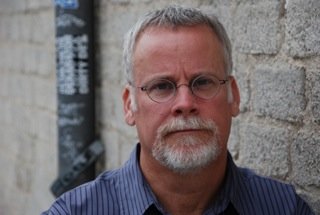Our soul track today?
"Stop," by Howard Tate, a 1968 song that was one of six songs by Tate to hit the top 20 in the R&B charts. Born in Macon, Georgia, Tate grew up in Philadelphia and was a well-regarded soul singer (Janis Joplin and Jimi Hendrix, among others, covered his songs) before his career fell apart in the early 1970s. He was out of the business, mostly hampered by dug dependency throughout the 1980s, emerging in 2003 for a minor comeback; he released five albums in the oughts-decade and toured frequently before dying from leukemia in December of 2011. Today, he is seen as a major soul singer by cultists and fans, but is virtually unknown by everyone else.
http://www.youtube.com/watch?v=GlxbxcR1el0
Wow, did a stomach bug hit me last night. I too must have picked up what Gabriel ever had coursing through him. I had to lie in a fetal position in bed for a good hour. Good God! I couldn't do much but lay in bed and watch Unforgiven.
Author Profile:
Michael Connelly
Born: Philadelphia, 1956.
Career: Connelly grew up in Florida and after graduating the University of Florida in 1980 (majoring in journalism, minoring in creative writing), he was firmly convinced that he wanted to be Raymond Chandler. He worked the crime beat for newspapers in Fort Lauderdale and Daytona Beach. He was propelled into the upper tiers of journalism when a magazine story he and two other reporters wrote on the aftermath for the survivors of a major airline crash was shortlisted for a Pulitzer. That story landed him in L.A., propelled to the position of crime reporter for the Los Angeles Times.
In 1992, he began writing mystery novels with a protagonist, Hieronymus (Harry) Bosch, who has, to date, anchored one of the most acclaimed, bestselling series of crime novels in modern literature. Bosch, an orphaned Vietnam vet, became a member of the L.A.P.D. in 1972; Connelly, starting with 1992's award-winning The Black Echo up through this coming November's The Black Box (the 18th Bosch), has charted the course of Bosch's career in the force while cannily providing an in-depth survey of the changing landscape of law enforcement, the police force, and L.A.
Connelly also has an ongoing series featuring Mickey Haller, who first appeared in 2005's The Lincoln Lawyer. Haller is a defense attorney who spends his days conducting his business in the backseat of his rolling Lincoln Town Car.
Noted Books: In the Bosch series: probably the first few ones in the series, including The Concrete Blonde (2004). The 1996 The Poet, a non-Boscher starring reporter Jack McEvoy about a serial killer, and its 2004 follow-up The Narrows were both well-received. Connelly's books are always bestsellers.
Themes, Style, Etc: With Connelly, you get very little characterization. His style is very streamlined, with little flab. He takes you, detail by detail, through the course of a case. The characters are usually tough, the investigations layered, the villains nasty, and there is usually one late twist or revelation in the case. There is, of course, conflict between local cops and the FBI; occasionally, there's some romance. Bosch is an appealing, likable character, though not a colorful, particularly interesting one. I think Connelly is so popular because his books are well-thought out, they move well, and he is incredibly knowledgeable about cops, their lifestyles, the justice system, and L.A.
Two of his books, 1998's Blood Work and 2005's terrific The Lincoln Lawyer were made into movies starring, respectively, Clint Eastwood and Matthew McConaughey; the latter film is an underrated, well-cast, spiffily scored, tense knockout.
Why You Should Read Him: Because he does what he does as well as anyone in the genre. Sometimes I think his books are a little colorless, under-imagined, average TV episodes, but when he's rolling, he's outstanding and fun - the story is constructed so well, and he makes the reader feel smart as we emerge ourselves into this gritty, messy world. I've read eight books by him.
Books I Would Recommend: The Lincoln Lawyer, 2005's The Closers (with Bosch working in the Open-Unsolved Unit, trying to piece together the 1988 murder of a mixed-race teenage girl), and 2008's The Brass Verdict - which partnered up Bosch and the Lincoln Lawyer!
Books I Want to Read: 2011's The Fifth Witness.
Author's Website: http://www.michaelconnelly.com/ (where I got all my info)
We're still making our way through our 100 Influential Photographers. We're going to speed it up a bit, so that maybe we can finish it by the end of the summer. I'll just start giving the briefest, most basic of information and three examples of their work - unless I feel a particularly well-known artist demands more expanse.
August Sander (#35)
The German-born Sander's (1876-1964) most enduring work was his "People of the Twentieth Century," a lifelong project to document the people of his native Westerwald, near Cologne, Germany. He photographed all walks of life, 600 people; the series was later banned by the Nazis because it didn't adhere to Hitler's conception of the Aryan type.
 |
| an architect and his wife |
 |
| Korps student |
 |
| farmhand |
Nan Goldin (#36)
Goldin, born in Washington D.C. in 1953, grew up in Boston and went to school in NYC. She had a troubled youth: her older sister committed suicide by laying down on the railroad tracks; she lived with foster families and spent a lot of time in communes. As an artist, Goldin is best-known for photographing (which is often then presented to viewers in a slideshow) her friends, her surrogate family, in various acts of illicit, illegal behavior - pornography, drugs, etc. Often these poses mimic those in fashion magazines. She is a master of the grunge scene, of the downtown, wigged-out NYC milieu of druggies, transvestites, and hangers-on.





No comments:
Post a Comment